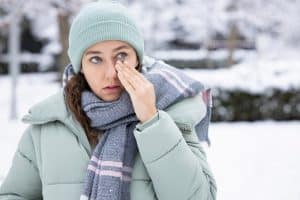Dry eye is a common condition that is not usually serious – but what is it exactly?[1] In this article, we explain what dry eye is, why you might be experiencing it, and what you can do to soothe the condition. Keep reading to find out more.
What are dry eyes?
You may have dry eyes if you notice that your eyes feel itchy, gritty or sore. They may look red, and you might notice that your vision becomes blurry. Your eyes might also be more watery than normal, or feel sensitive to light.
You may find that you experience eye dryness occasionally, but it could also be something that you suffer with on a more long-term basis. It can be difficult to pinpoint the reason behind dry eyes as there are many different factors that can contribute to this condition. In some cases, dry eyes are linked to another underlying health condition you may have, such as diabetes, rheumatoid arthritis, thyroid disease, lupus, blepharitis (inflammation of the eyelids) or Sjögren’s syndrome (a condition that affects the production of bodily fluids, like tears and saliva).[1] It can also develop as a result of the changes in hormone levels during pregnancy and menopause.[2]
What causes dry eyes?
You can develop dry eyes if the glands in your eyes don’t produce enough tears to stay wet, or if your tears are not of the right quality. You may also develop this condition if your tears don’t spread across the front of your eye properly, or if they dry up quickly.
Anyone can experience dry eyes, but you are more likely to have this condition if you are aged 50 or over. This is due to the fact that, as we age, our eyelids are not as good as spreading tears each time we blink, and the glands in the eyes that are responsible for producing tears become less effective.
Contact lens wearers may be more susceptible to developing dry eyes, as well as those who spend long periods of time in front of a computer screen without taking a break. Certain environmental conditions can cause dry eyes too. For example, dusty, cold or windy environments can lead to sore, dry eyes, as can spending time in an air conditioned or heated room.
You may be more likely to develop dry eyes if you smoke or drink, or if you take certain medications. For instance, it’s thought that some types of antidepressants or blood pressure medicines can cause dry eyes.
You can keep the irritation of dry eyes at bay by practising healthy eye care habits, such as making sure you clean your eyelids thoroughly. If you wear contact lenses, you should make sure that you avoid wearing them for long periods and use your glasses to let your eyes rest. You should also make sure that you take regular breaks when using a computer screen.[1,2]
To help soothe the side effects associated with dry eyes, you could use TheraTears® Dry or Tired Eye Drops, which is a daytime treatment that uses hyaluronic acid to encourage the formulation of tears. Alternatively, our TheraTears® Overnight Restore Eye Drops are designed for use just before bed to help you get a good night’s sleep without dry eye keeping you up.
Why do I have dry eye in one eye?
Dry eye typically affects both eyes, but this is not always the case. You may notice that you develop the signs of dry eye, such as an itchiness, redness, blurred vision or sensitivity to light, in one eye but not the other. It can be normal to experience dry eye syndrome in just one eye, but if you have any concerns regarding your eye health, you should speak to your optician or GP for further advice.[3]
Resources:
[1] https://www.nhs.uk/conditions/dry-eyes/
[2] https://www.rnib.org.uk/your-eyes/eye-conditions-az/dry-eye/







